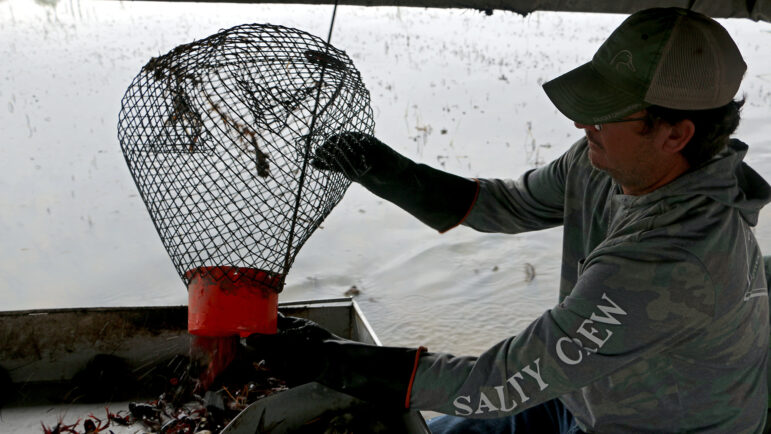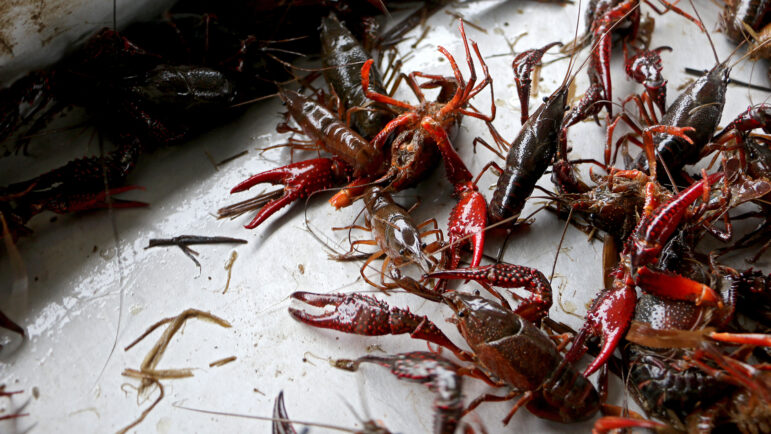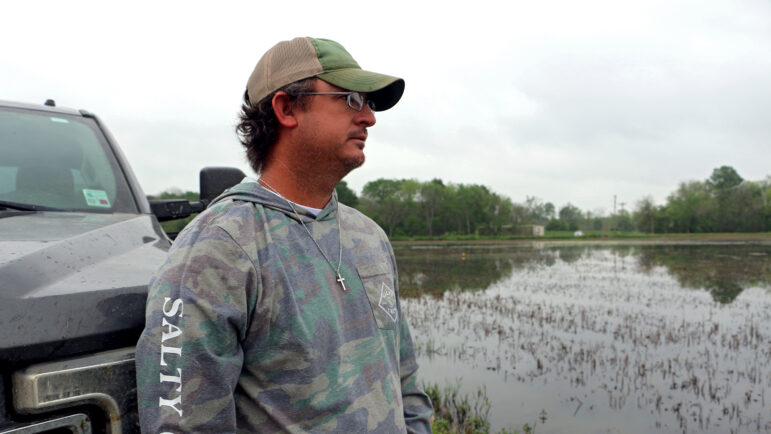Crawfish prices are finally dropping, but farmers and fishers are still struggling
Adler Stelly has been farming crawfish for his entire life. He said he’s been hit hard by the drought.
By Eva Tesfaye/WWNO & Maya Miller/Gulf States Newsroom
It’s a cloudy day in mid-March, and Adler Stelly is harvesting crawfish on the flooded 3,000 acres he and his brother own in Abbeville, Louisiana. He flooded his fields regularly during last year’s drought in hopes of keeping his crawfish alive.
On this day, he harvests a good amount of decent-sized crawfish. He bags about 20% of what he normally catches — a bit more than what he’s averaged per catch lately, but it won’t be enough to save the harsh season he’s endured.
“There’s no way I’m making back the money that we have out there, but there are crawfish starting to come in areas,” Stelly said. “We do need the consumers to come in and start eating a few.”
Crawfish farmers and wild fishers are navigating one of the worst seasons for seafood crops ever after a summer drought led to low crawfish numbers. Farmers are hoping for a bail-out from the federal government but, for some, that help hasn’t come quickly enough.
Stelly has been crawfish farming his entire life, and he said this is the worst season he’s ever seen. Inflation has already hit his farm hard, with the price of labor and bait increasing. His only silver lining is that he plans to pass the farm along to his daughter, and he’s glad this happened before she takes over.
“As hard as it is to take this type of hit, I’m just glad that it’s happening to me after I’ve been in business for a few years and not happening to her in her first year of trying to get in business on her own,” he said.

Consumers are also feeling the squeeze from the drought through high prices at fish markets, with live crawfish costing around $7 a pound. Prices are slowly going down as the season nears its end, but rates across the region are still higher than the usual average.
Stelly said last year’s drought also made farming costs even higher after he had to flood his fields much more than he normally would. The drought and extreme heat also killed a good portion of crawfish crops. Mark Shirley, an extension agent with Louisiana State University AgCenter, said the ground became so dry the crawfish couldn’t breathe.
“There was no moisture to keep the gills working and they just died,” Shirley said. “Probably 90% or more of the crawfish died in their burrows during the summertime.”
On top of this season’s losses, farmers have the added expense of paying to replace the crawfish needed for breeding for next year. Mike Strain, Louisiana’s Department of Agriculture and Forestries commissioner, said this drought will cost the industry upwards of $140 million this year.
“Some of the farmers quit fishing completely because there are no crawfish,” Strain said.
Strain, as well as some Louisiana lawmakers, reached out to the U.S. Department of Agriculture for help. Through the Emergency Livestock Assistance Program, farmers could receive payments to cover debts and farming expenses, which Strain said would provide much-needed relief.
“Many of them cannot get another crop loan because they were not able to pay off last year’s crop loan,” he said. “They desperately need those dollars.”

Louisiana Gov. Jeff Landry even made a disaster declaration to speed up the process, but some in the industry will still be left out of the assistance.
Jody Meche, a third-generation fisherman living near the Atchafalaya Basin in South Louisiana, has been trapping wild crawfish for over 30 years. But he’s not eligible for that federal relief because he fishes for crawfish and resells them rather than farms them.
“We don’t ever get any help from the government,” Meche said.
He said Basin water levels have been declining for the past few decades, which means less habitat for the crawfish. He’s had to figure out each slow season on his own.
“When COVID hit, we suffered the loss in the market shutting down the same way the crawfish farmers did,” he said. “Our congressional delegation got millions of dollars of help for the farmers and the basin fishermen got no help at all.”

In March, the Small Business Association began offering low-interest loans for small businesses impacted by last fall’s drought, but unlike the federal relief, fishers would be responsible for repayment.
During a good season, Meche would collect about 1,000 pounds of crawfish every day. Now, he’s barely breaking a few hundred. On a good day, he can make about $800 for a day’s work. But with fuel for his boat and bait for his traps racking up costs, he’s still thousands of dollars in the hole.
Crawfish fishing, however, is what he was raised to do, and he wants to continue his family’s legacy — even through the hard times.
“That history and tradition of following in my father’s and my grandfather’s footsteps, of being able to make a living and sustain my way of life by going into the wild and catching something to provide an income for me and my family,” he said. “It’s just that drive to not be a failure and to be able to continue to do it like they were able to do it.”
This story was produced by the Gulf States Newsroom, a collaboration between Mississippi Public Broadcasting, WBHM in Alabama, WWNO and WRKF in Louisiana and NPR.
40 years after ‘Purple Rain,’ Prince’s band remembers how the movie came together
Before social media, the film Purple Rain gave audiences a peak into Prince’s musical life. Band members say the true genesis of the title song was much less combative than the version presented in the film.
Park Fire in California could continue growing exponentially, Cal Fire officer says
Cal Fire has confirmed that over a hundred structures have been damaged in the Park Fire, which grew overnight near Chico, Calif. Difficult firefighting conditions are forecast through Friday night.
Checking in with Black voters in Georgia about the election, now that Biden is out
Some voters who could be key to deciding who wins Georgia. What do they think about Vice President Harris becoming the frontrunner in the race to be the Democratic nominee?
Tahiti’s waves are a matter of ‘life and death’ for surfing Olympics
Tahiti's Teahupo'o wave has a slew of riders for the Paris 2024 Olympics. NPR finds out why it's called one of the most dangerous waves.
Researchers are revising botanical names to address troubling connotations
Since the mid-1700s, researchers have classified life with scientific names. But some of them have problematic histories and connotations. The botanical community is trying to tackle this issue.
A spectacular opening ceremony wowed a global audience despite Paris’ on-and-off rain
The Paris Olympics opening ceremony wowed Parisians, fans and most everyone who was able to catch a glimpse of thousands of athletes floating down the Seine to officially begin the Games.



